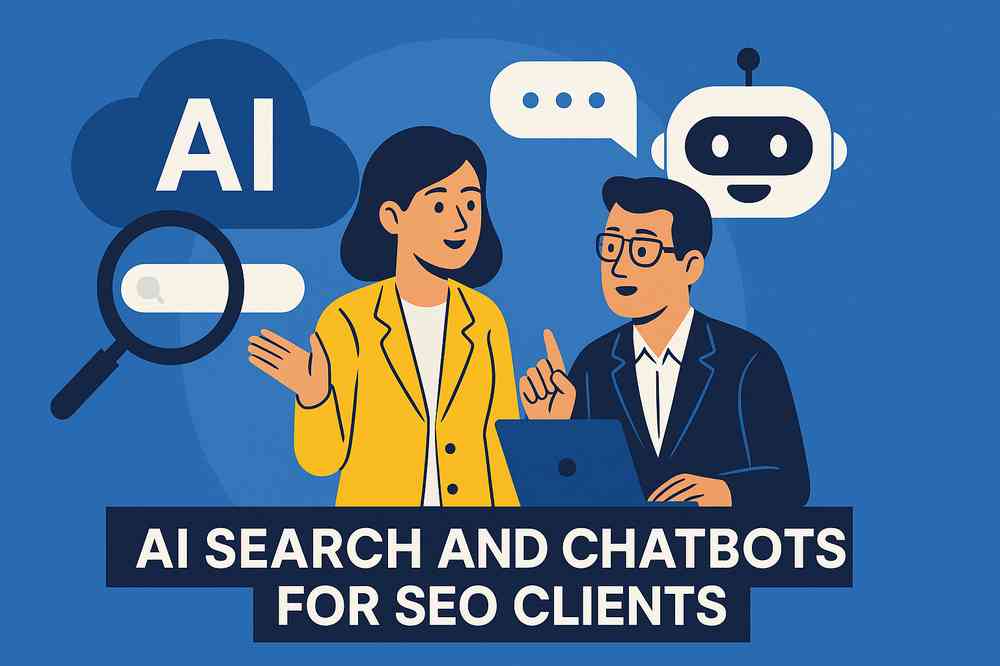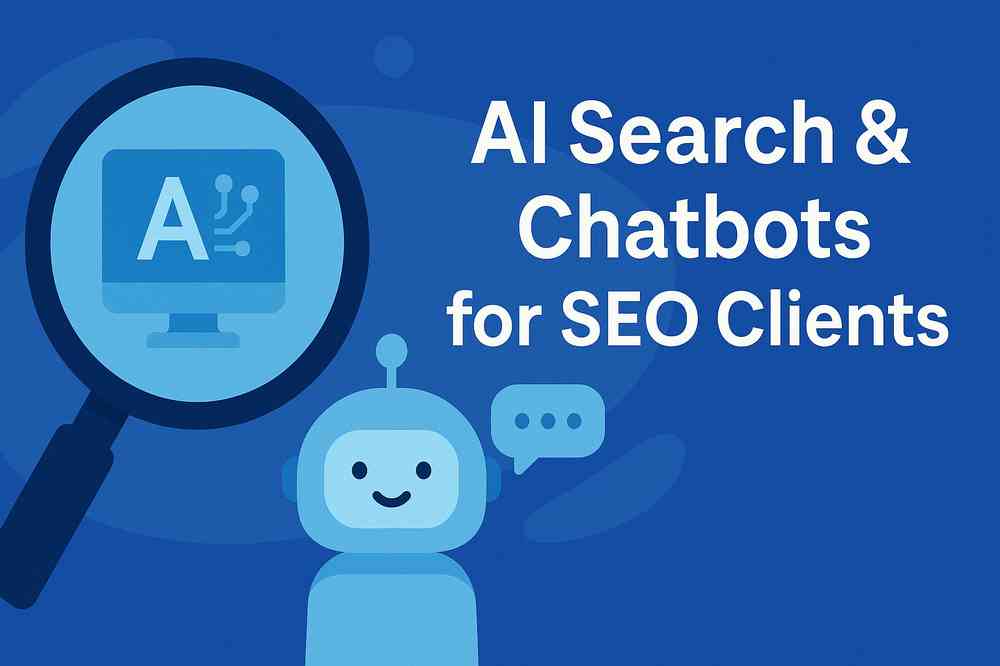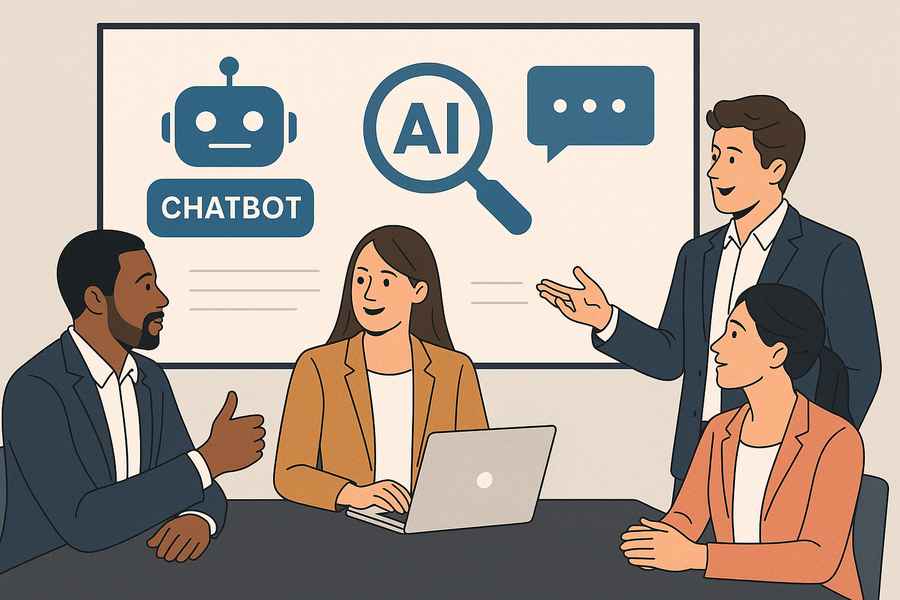Introduction
In the past year, more attention has been paid to AI-triggered technologies, which have vastly improved business activities, CMOs, and decision-making during the SEO discovery. Dialogue around AI-powered search and chatbots is no longer a distant topic for SEO strategies, and the new years are witnessing uncertainty approaches toward clients.
A window thus opens between opportunity and threat for the SEO professionals: potential clients now want more than just rankings; they inquire about AI integration, transformation of search experience, and automation of customer interactions.
In this article, we propose a way for the SEO consultant to address AI-related issues in the SEO discussion; how the client’s expectations have changed and what plans the SEO consultants need to prepare to stay ahead.
Why AI Is Now a Top Concern for SEO Clients
1. Clients Are Watching Google and Microsoft Closely
AI integration into search engines such as Google’s Search Generative Experience (SGE) or Microsoft’s Copilot on Bing has made business owners curious and cautious at the same time. They’re hearing about zero-click search, AI-generated answers, and declining traditional SERP visibility.
Naturally, they start wondering:
- Will my organic traffic drop?
- Are people still clicking on links?
- Should we start optimizing for AI summaries or snippets?

2. Everyone Is Talking About Chatbots – Even Non-Tech Clients
Chatbots are no longer a novelty. Thanks to tools like ChatGPT, clients are interacting with AI daily. This personal exposure leads them to ask:
- Can we use AI chatbots for customer support?
- Will Google penalize AI-generated content?
- Should we add a chatbot to our website for lead generation?
These questions may not come from SEO-savvy clients but from business intuition. Clients feel the tech shift and want to be prepared.

The New Discovery Call: What Clients Ask Now
SEO consultants are noticing a transformation in the first client meeting. Alongside usual questions like “How long does SEO take?”, clients are asking:
- “How is Google changing with AI?”
- “Will SEO still matter in five years?”
- “Can we rank in ChatGPT answers?”
- “What are AI Overviews, and how can we be featured?”
These are critical opportunities for SEOs to educate, guide, and build trust.
How SEOs Should Respond: Key Talking Points
When clients bring up AI, your response needs to reassure and inform without overpromising. Here are the core ideas you should focus on:
1. SEO Is Still Evolving, Not Dying
Just to clarify: AI does not replace SEO but rather changes its way. AI can answer queries directly or provide summarized answers, but for that, AI must have indexable, good-quality content from websites. Hence, AI responses, snippets, or SGE overviews require structured content with strong authority and technical SEO for visibility.
2. Content Is Still King But the Format May Shift
Clients must be taught that original content, with people at the highest considerations, really matters. AI tools can reword or summarize, but rendering insight, E-E-A-T (Experience, Expertise, Authoritativeness, Trust), or brand storytelling is beyond their scope.
Explain how you will help them:
- Create valuable content that’s AI-friendly
- Use schema markup and FAQ structures for better AI visibility
- Optimize for “conversational queries”
3. Chatbots Are Great but Not a Replacement for Search
If clients want to explore chatbots, discuss how AI chat tools can enhance UX, reduce bounce rates, and qualify leads but should be viewed as add-ons, not traffic-drivers.
Also, clarify the risks:
- AI hallucinations
- Privacy concerns
- Missed long-tail keyword discovery
It’s okay to suggest experimentation but with clear strategy and monitoring.
SEO Services Clients Are Now Interested In (Because of AI)
Smart agencies are noticing a demand surge in certain areas due to AI trends. These include:
| New-Age SEO Services | Why Clients Care |
| Content Audits for AI Visibility | To see if current pages are optimized for AI snippets |
| Schema & Structured Data Implementation | Improves chance of being picked up by AI systems |
| AI-Powered Content Strategy | Blending human and AI content for blogs, FAQs, and guides |
| Chatbot Integration with SEO Goals | Making sure bots assist without replacing important search flows |
| Conversational SEO | Optimizing for natural language queries and long-tail voice search |
| Brand Mentions Monitoring in AI Responses | Understanding how brands are portrayed in LLMs and AI answers |
Red Flags: What Not to Promise
Clients may be enthusiastic, but don’t fall into the trap of guaranteeing AI rankings. Set these boundaries:
- You can’t control what ChatGPT or Gemini shows there’s no direct indexing or sitemap.
- There are no formal guidelines yet for optimizing AI-generated search responses.
- AI tools change frequently what works now may not work next month.
Instead, position yourself as a forward-thinking advisor who tracks the changes and adapts strategies accordingly.
Real-World Example: What a Client Conversation Looks Like
Client: “I heard ChatGPT gives answers directly. Why would people visit our website anymore?”
SEO Consultant: Those are fair concerns to have. But those answers still come from real content content that lives on websites like yours. Assuming your site is well-optimized and authoritative, it will become the source for those answers. Besides, AI tools include links
to their sources often.
or mention brands. So our goal is to make your content the kind that AI wants to use.”
This approach educates, calms fear, and opens up an ongoing strategic discussion.
FAQ: AI and SEO Conversations with Clients
Not entirely. AI will enhance and reshape the search experience but not replace organic search traffic completely.
Focus on strong content, structured data, and topical authority. AI tools pull from high-quality, indexed sites.
Chatbots are useful for on-site engagement, but they’re not a traffic generation tool. Consider them part of UX, not SEO replacement.
Not directly. You should use AI tools only for drafting or ideation. Final content must pass E-E-A-T principles and reflect human insight.
Content optimization for AI visibility, schema implementation, and long-form original articles with structured subtopics are increasingly valuable.
Conclusion: Shift From SEO Tactics to SEO Conversations
SEO in 2025 is not just about Google rankings and backlinks anymore. It is about digital ecosystems in which the customers are living, and now AI is part of the ecosystem.
Clients are no longer asking, “What is SEO?”, but rather they ask, “So what do we do with all this AI stuff?” Great, as it means they are involved, forward-thinking, and ready to be advised.
Your best asset as an SEO practitioner should be the ability to steer conversations instead of just offering technical solutions. In conversations surrounding AI, trust can be deepened, value showcased, and additional services can be pitched.
Kumar Swamy is the CEO of Itech Manthra Pvt Ltd and a dedicated Article Writer and SEO Specialist. With a wealth of experience in crafting high-quality content, he focuses on technology, business, and current events, ensuring that readers receive timely and relevant insights.
As a technical SEO expert, Kumar Swamy employs effective strategies to optimize websites for search engines, boosting visibility and performance. Passionate about sharing knowledge, he aims to empower audiences with informative and engaging articles.
Connect with Kumar Swamy to explore the evolving landscape of content creation!
